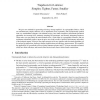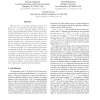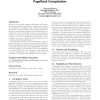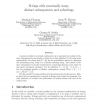387 search results - page 9 / 78 » Many Random Walks Are Faster Than One |
IACR
2011
12 years 8 months ago
2011
We give new methods for generating and using “strong trapdoors” in cryptographic lattices, which are simultaneously simple, efficient, easy to implement (even in parallel), a...
ADC
2008
Springer
14 years 3 months ago
2008
Springer
This article describes how to implement efficient memory resident path indexes for semi-structured data. Two techniques are introduced, and they are shown to be significantly fas...
ICPR
2006
IEEE
14 years 10 months ago
2006
IEEE
Viola and Jones (VJ) cascade classification methods have proven to be very successful in detecting objects belonging to a single class -- e.g., faces. This paper addresses the mor...
WWW
2005
ACM
14 years 9 months ago
2005
ACM
In this note we consider a simple reformulation of the traditional power iteration algorithm for computing the stationary distribution of a Markov chain. Rather than communicate t...
COMBINATORICS
2004
13 years 8 months ago
2004
A natural problem in extremal combinatorics is to maximize the number of distinct subsequences for any length-n string over a finite alphabet ; this value grows exponentially, but...




